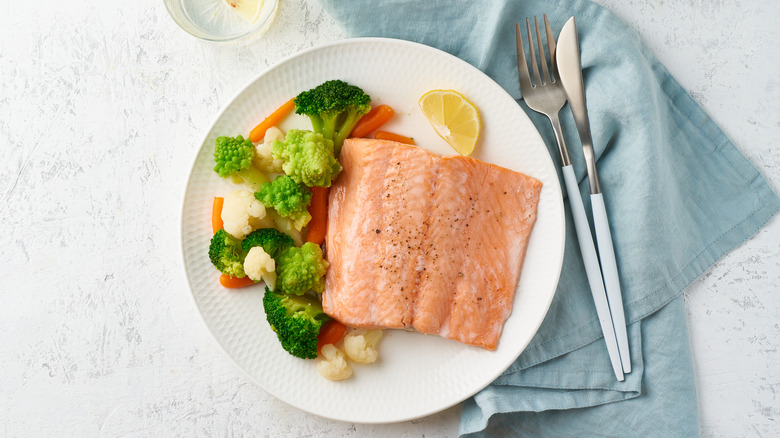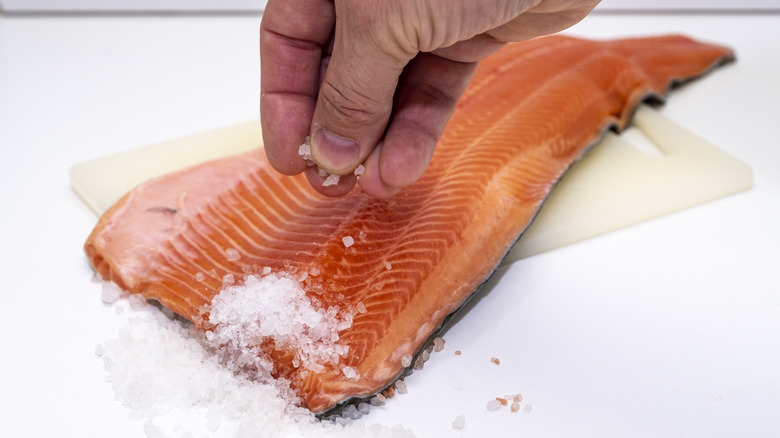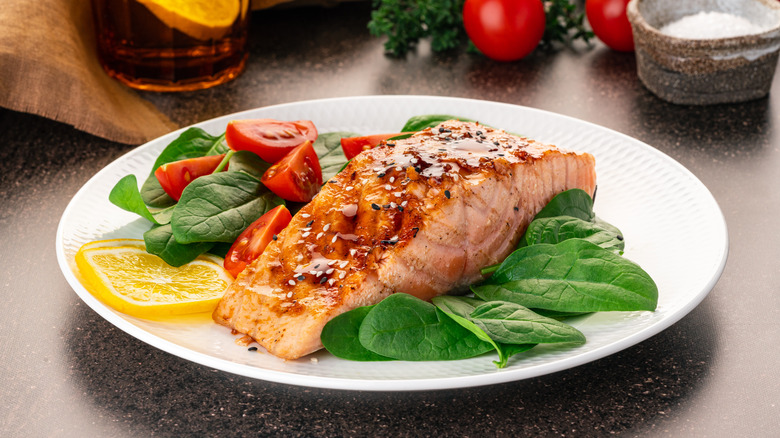What Exactly Is The White Stuff You See On Salmon?
Whether you already love salmon from eating it in restaurants, or if you're trying to eat more because you've heard it's healthy, you might be in for a surprise the first time you cook salmon at home. Not only do you have to learn how to cook it so it's not dry and flavorless, but you might also notice something strange when it starts heating up: little globs and rivulets of a white substance appearing on the surface of the salmon as it cooks, looking a bit like scrambled egg whites. So what is it?
Luckily, the white stuff you see coming out of salmon as it cooks isn't dangerous, and it's not a sign that there's anything wrong with your fish. The white stuff oozing from your salmon is called albumin. Albumin is a protein found in salmon that's liquid when the fish is raw. But as the fish is heated, the muscle fibers of the meat contract, squeezing out the albumin. Thanks to the heat, the albumin cooks and turns opaque, resulting in that white goo you see. It's totally safe to eat, but it can look pretty unappetizing. Thankfully, there are a few different ways to minimize how much albumin appears when cooking salmon.
Preparing your salmon the right way can reduce albumin
They say an ounce of prevention is worth a pound of cure, and in this case, there are a couple of different things you can do before your salmon even hits the pan to help prevent it from leaking excess albumin as it cooks.
Chef and food writer J. Kenji López-Alt wrote for The New York Times that his trick is dry-brining salmon. He adds about a teaspoon of kosher salt per 5-ounce salmon fillet. How does this prevent goo? López-Alt explains that the liquid that is pushed out of fish it's cooked isn't just water; it's mixed with albumin proteins. López-Alt writes, "As that water is expressed from inside the fillets, proteins come along for the ride, coagulating in unsightly white blobs on the salmon's surface." So if you want to prevent those white blobs on the surface of your salmon, you have to draw out some of that liquid before you cook your fish, and that's where dry brining comes in. Fresh fillets are filled with moisture, but when you dry-brine salmon, much of this liquid evaporates while the fish is resting in storage. When you cook this dry-brined salmon, there is less moisture and less albumin to rise to the surface.
Another step that can help you reduce albumin in cooked salmon is pulling the fish from the fridge and letting it rest until it reaches room temperature. That's because albumin is expressed when the meat contracts due to high heat, squeezing out the liquid and proteins, but if there is less of a temperature discrepancy between fish and pan to begin with, it can help reduce that leakage. It will also help the fish cook more evenly.
How to cook salmon so it produces less albumin
You've dry-brined your salmon and let it come to room temperature. Now what? To reduce the amount of albumin that's squeezed from your salmon as it cooks, the most important thing to consider is the heat of your pan. Cooking your salmon low and slow, in the oven, grill, or on the stovetop, will result in the muscle fibers contracting less quickly, giving the albumin time to solidify as it cooks within the flesh rather than having it squeezed out into the pan.
Another key is to cook your salmon skin-side down. The skin helps protect the fish from being shocked by the heat of your pan, which can reduce the amount of albumin that is expressed as the fish cooks. Even if you don't plan on eating the skin, you can always just take it off before you eat.
And if you don't have the time to cook fresh salmon in a hot skillet, and wind up with fish covered in coagulation? It's okay — we all make mistakes when cooking salmon. You can just scrape the white globs off with a spoon or a damp paper towel, and try to forget what you saw as you dig in. And don't forget that a generous dollop or two of a simple tartar sauce can hide pretty much any seafood woe.


